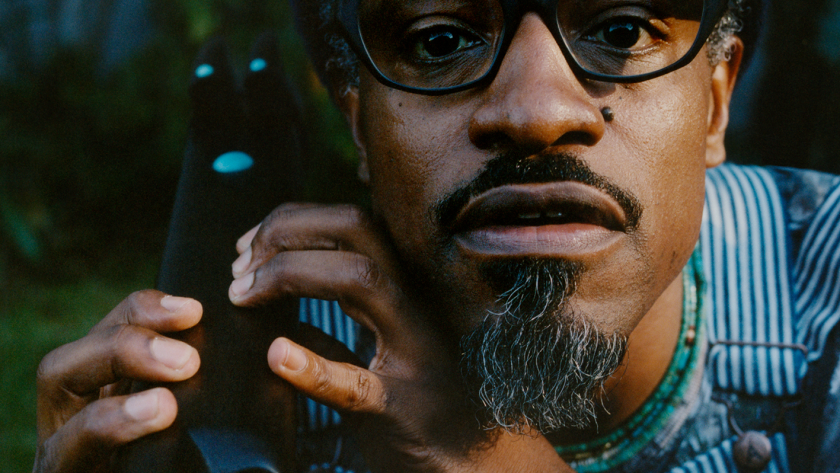Introducing the first-ever GQ Video Cover Story, a new format that delivers all the access and depth of a classic GQ print profile—but does it via longform digital video. For our inaugural Video Cover Story, we’re proud to unveil this 34-minute immersive feature on André 3000. Watch the video, reported by GQ’s Zach Baron and directed by Noel Howard, in its entirety above, and read the accompanying profile from our 2023 Men of the Year issue below.
When André 3000 was a kid, he used to get on his knees and recite what he called the Rapper’s Prayer, which was what it sounds like it was: Lord, we just want to be good rappers. Then he grew up a little and, with his friend Big Boi, who used to kneel and pray beside him, formed OutKast. OutKast turned out to be more than good—the group was great, among the greatest of all time. This year, the duo’s fifth album, 2003’s Speakerboxxx/The Love Below, was certified platinum for the 13th time, making it the best-selling rap album in history. André has been wrestling with the consequences of that childhood prayer ever since it was answered. “That’s life: You want what you want until you don’t want it,” he says, laughing a little. “I don’t regret any of that, but it’s kind of like now that I’m at a certain level, I miss certain things about normalcy.”
That’s why he comes here, to this laundromat on the Westside of Los Angeles, not far from his house in Venice. One of the reasons, anyway. “It gives me a chance to be out in the world,” he says. (Another reason: The industrial washers and dryers are faster than the ones he has at home.) The other customers notice him but don’t recognize him, usually. “I’m older now, so a lot of people, they see me: ‘You look like him, but nah, that ain’t 3000.’ ”
I am less than sure about this—very few people in human history have looked like André 3000, who at 48 still has the handsome face and lean-closer voice that he did when he was 19, and though his present daily uniform of overalls over a camouflage shirt is perhaps less flamboyant than what he wore during the height of his fame, it’s still overalls over a camouflage shirt. Plus, he usually carries a flute with him, to play in the alley out back while he waits. “I play everywhere,” he says. “If I’m waiting on a cup of coffee, if I’m just outside of my car—I take my flute pretty much everywhere I go.” Perhaps you’ve seen videos: André wandering an airport, or the streets of Philadelphia, coaxing out eerie melodies from a variety of wooden instruments.
In November, André will release his first new record since the last OutKast one, 2006’s Idlewild. It is called New Blue Sun. There is no rapping on it. There are, in fact, no identifiable vocals at all: It is a record built almost entirely around woodwind instruments, full of long, winding songs with long, winding titles. It’s a delicate, whimsical document—New Age music for an age that hasn’t quite dawned yet. André recorded it here in Venice, at a few different studios with a handful of other session musicians, last year. The recordings you hear are more or less improvisations: everyone’s first time through the song.



